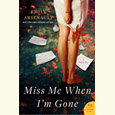A Voice of Exile
In Patrick O’Keeffe’s The Visitors, an Irish immigrant finds that home is inescapable
Most Americans think of the Irish immigrant as a figure belonging to America’s past, especially to the nineteenth and early-twentieth centuries, when millions of Irish men and women came here fleeing famine and poverty. But the stream of Irish arrivals has never entirely dried up, and Patrick O’Keeffe’s hypnotic debut novel, The Visitors, features a modern-day immigrant who is haunted by the home he left behind and unable—or perhaps unwilling—to make himself truly at home in the U.S. O’Keeffe’s Jimmy Dwyer is not so much an immigrant as an exile, perpetually displaced, and the novel conveys with brilliant sympathy his sadness and existential unease, even as it delivers up a story rich with plot twists and mysteries.
 James Dwyer tells his own story and begins it with a night “seven years ago” in July 2000, when a seemingly homeless man appears at his door. After drawing Jimmy out of his apartment with a tale about an old lady in distress, the man, whose name is Walter, accepts the Irishman’s kindness and eventually reveals his true mission: to deliver a message from a fellow named Kevin Lyons. Kevin and Jimmy grew up together, and their fathers were best friends, but there’s no love lost on Jimmy’s side. Kevin was his boyhood nemesis, and he represents everything that’s painful about the life Jimmy left behind. But Kevin, who has made a successful life for himself in America, is eager to reconnect with Jimmy. “Needs and wants you to go see him,” says Walter again and again, parroting Kevin’s message.
James Dwyer tells his own story and begins it with a night “seven years ago” in July 2000, when a seemingly homeless man appears at his door. After drawing Jimmy out of his apartment with a tale about an old lady in distress, the man, whose name is Walter, accepts the Irishman’s kindness and eventually reveals his true mission: to deliver a message from a fellow named Kevin Lyons. Kevin and Jimmy grew up together, and their fathers were best friends, but there’s no love lost on Jimmy’s side. Kevin was his boyhood nemesis, and he represents everything that’s painful about the life Jimmy left behind. But Kevin, who has made a successful life for himself in America, is eager to reconnect with Jimmy. “Needs and wants you to go see him,” says Walter again and again, parroting Kevin’s message.
At this time Jimmy is a man in his thirties whose life has consisted of a series of flights, first from his hardscrabble rural childhood to Dublin, then to Boston, and finally to Ann Arbor, Michigan, where he’s half-heartedly pursuing a graduate degree. His primary occupations are working in a bakery, spending time with girlfriend-of-the-moment, Zoë, and getting high, not necessarily in that order. Walter’s appearance touches off a long reverie revealing Jimmy’s history and the loves, loyalties, debts, and grudges that tie his family to Kevin’s. Unable to resist the pull of the past, Jimmy travels to Kevin’s home in upstate New York, where some old mysteries are explained and the present collides with the past in a violent, unexpected way.
O’Keeffe packs a heck of a lot of story into the 270-plus pages of The Visitors, including several troubled love affairs and a killing or two, and he carries it all along with a fair degree of tension. No one could complain that this is a literary novel without a plot. But for all its narrative virtues, the principal pleasure of the book may lie in the spellbinding voice of Jimmy, who calls forth his past so vividly, with such deft honesty, that the reader truly sees it through his eyes. He piles detail upon detail, bringing alive the dreary rural village, grimy Dublin, alien Boston—but those details are never divorced from what they mean to him. The emotional resonance of mundane memory is gracefully revealed in the flow of his thoughts, as when he thinks of his former lover, Una, boiling water to prepare eggs:
She said the eggcups got cracked on the train on the way up, but you knew to look at those cracks that they had been there for a long time. Those were settled cracks. And boiling kettles of water for late-night baths in her tiny bathtub, washing the sticky hairspray out of her black hair. She cried every time I washed her hair. And I never asked her why.
This hypnotic stream-of-consciousness style seems like a slightly daring approach to take in telling such a complicated story, but O’Keeffe (whose 2005 collection of novellas, The Hill Road, won the prestigious Story Prize) pulls it off with considerable elegance. The voice is never wearying, and the narrative does not get lost.
O’Keeffe himself has roots in rural Ireland and, like Jimmy Dwyer, came to the U.S. in the 1980s. Although The Visitors contains fleeting references to recent Irish history, and specifically to the waxing and waning of the Irish economy, the book never reads like a commentary on Ireland or the “immigrant experience.” When Jimmy and his Dublin pal first make up their minds to apply for visas, Jimmy says, joking, “We’ll be statistics.” The sting behind the quip, of course, is that no statistic can convey the human truths of home, yearning, and exile. O’Keeffe does that through the singular voice of Jimmy Dwyer.
Patrick O’Keeffe will discuss The Visitors at the University of Tennessee’s Hodges Library in Knoxville on March 31, 2014, at 7 p.m.


